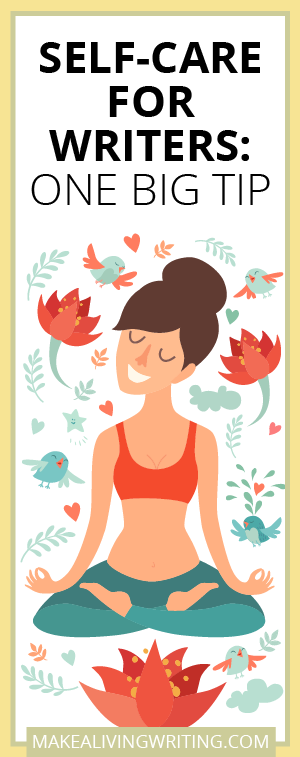Freelance writers spend a lot of time reading posts, taking courses, and otherwise seeking information on how to build their careers. But what about self-help for writers?
Working on self-care can build your self-esteem up and make you far more productive and creative. And when I say self-care, I don’t mean bubble-baths and walks in the woods, either.
What I have in mind goes much deeper than catching a little ‘me’ time.
Recently, I took a training on one powerful self-help technique that every insecure writer could benefit from. This approach can help you get more and better writing done, put yourself out there more, and gain the confidence to pitch better clients.
Ready to take your writing — and your life — to a whole new level? Read on…
It’s easy to give to others…
To begin learning this self-care technique, gather a group of friends. Ideally, writer-friends, but really, any group of friends will do.
Every participant takes a piece of paper and writes their name at the top. Next, pass the papers around.
As you get each paper, write something positive about a strength you admire in the person named at the top of that sheet.
Eventually, the paper rotates back around to you, and you get to see all the amazing qualities your friends see in you.
Self-perception is a little tricky
When I did this with a parenting group I’m in, I was completely blown away by what I received. Though I think of myself as lacking answers and struggling mightily to parent my special-needs teens, that wasn’t what others thought. My sheet had comments like:
You are strong!
You freely share your knowledge and help others
I admire your perseverance
Your sense of humor is awesome!
I love your frankness and how you cut right to the heart of a problem
And so it went. The picture these other parents had of my character and abilities was so different from the one I had in my head.
Everyone in the group felt the same way about their feedback. We were in tears. It was a fresh look at ourselves and our achievements and character strengths. What a confidence-builder!
The big thing? We all commented on how easy it was to find complimentary things to say about each other.
The next step was tougher.
Cut yourself a break, hm?
This exercise is the first step in learning how to practice self-compassion.
That’s the fine art of cutting yourself a break when you fall short of your goals.
When’s the last time you did that?
If you screw up a writing assignment, do you ever just say, “Oh well. I’m sure I’ll do better next time. I’m trying hard, and I’m a good person.”
Or maybe you note that you are human, after all, and everyone makes mistakes.
I hope so. But in my (personal!) experience, that’s not what happens. Instead of building ourselves up, we beat ourselves up, as writers.
The script tends to go more like this:
“I can’t believe I screwed this up. I’m a failure.
“I’ll never measure up to what other writers are doing. Maybe writing just isn’t for me.”
Self-help for writers habits, like giving yourself a break, can have a big impact on your work. You may have heard there’s power in forgiveness — in fact, helping people forgive others who’ve hurt them has become a cottage industry in the self-help world.
But what about forgiving yourself? Do you have compassion for your own circumstances? Often, that’s undiscovered country.
This is where you are
Once, I was unloading all my parenting woes on a friend of mine. She nodded her head quietly, as I explained what a failure I was, how many bad decisions I’d made, how unfixable the whole situation was.
Her response was to pat my hand soothingly, and say:
“Well, I’m sure you did the best you could.”
My mouth fell open. That’s not what I think, when I look at my shortcomings! I always think that somehow, I could have done better.
Is this true of how you view your writing? Aren’t you giving it your all, given your current circumstances? And yet, we often run ourselves down about our efforts.
The problem is that constantly beating ourselves up isn’t a gateway to self-improvement. You can’t browbeat yourself into being a better writer. But practicing self-compassion works wonders. If you’re dwelling on doubts, frustrations, and failures, it’s time to give my self-help for writers sermon a little more attention.
Forgive: The simple self-help for writers challenge
If you can’t remember the last time you cut yourself a break, maybe it’s time for a little self-compassion. Show yourself a little love.
Why? Because this self-help for writers strategy opens the doorway to radical change.
The humanist psychologist Carl Rogers says:
“The curious paradox is that when I accept myself just as I am, then I change.”
That’s right. Self-acceptance — loving yourself just as you are — opens the door to transformation.
Here are a few things you might want to accept and forgive yourself for:
- Not writing sooner
- Not writing better
- Not writing more
- Not earning (or earning more) from writing
- Not being farther along in your writing career
Just…let these supposed shortcomings go.
Then, replace them with another thought: Maybe there are no coincidences or accidents, and you are exactly where you’re meant to be in your writing journey.
In any case, you are where you are. If you can accept that, then you can move forward. What you can control is what you do today. Give yourself a fresh start, and check out this meditation for moving up found in this past blog post.
Keep practicing
Now it’s time to get out a sheet of paper, write your name at the top — and give yourself some compliments. Spend a little time, each day, focusing on your strengths.
Yes, it’ll be harder to find compliments to give yourself than it was to do for others, if you usually hand yourself nothing but put-downs. But with practice, you’ll get better at it.
The more you accept yourself, the more relaxed, calm, and happy you’ll feel. And that can be a vibrant wellspring for creativity.
Are you a self-compassionate writer? Let’s discuss your self-help routine over on Facebook.











